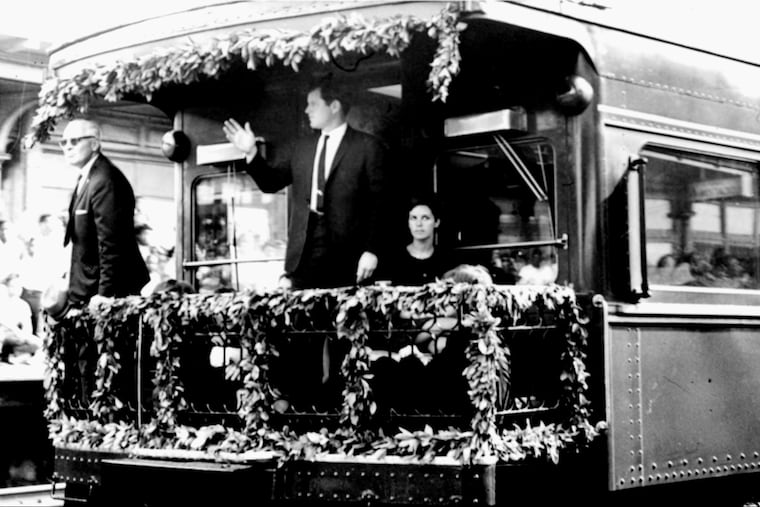Chris Matthews: After Robert Kennedy’s assassination, 20,000 people sang together at Philly’s 30th Street Station | Perspective
It was reported that others in the station were so overwhelmed by the presence of such emotion, they began to weep openly.

It sits, 50 years later, left alone and protected in a North Philadelphia train barn.
In June 1968, it carried the body of Robert Kennedy along the Amtrak route from New York to Washington. That epic eight-hour journey belongs, like the train car, to the ages. No one alive today can remember such a soulful vigil for an American political figure.
In Philadelphia alone, 20,000 strong stood at 30th Street Station singing "The Battle Hymn of the Republic" in his honor. It was reported that others in the station were so overwhelmed by the presence of such emotion, they began to weep openly.
That outpouring of affection was, by itself, the historic tribute for the man whose body lay in that passing train car. That grim day held none of the pageantry of his brother's day of mourning. There was no President Charles de Gaulle or Emperor Haile Selassie, no riderless horse bearing the cavalry boots turned backward.
>> READ MORE: How the chaos of 1968 set the stage for a President Donald Trump | Will Bunch
There was, instead and simply, standing along those tracks the America who believed in Bobby Kennedy: the African Americans standing prayerfully in Newark and Trenton and Philadelphia, then down waiting at Wilmington and Baltimore; the poor whites in the rough land in between, saluting the man they, too, held in affectionate patriotism.
In a powerful way, this route itself — lined by more than a million people — connected the two poles of RFK's life: his religious faith celebrated at the great St. Patrick's Cathedral, and his commitment to country at Arlington Cemetery, where he would join his brother and the other sacrificed souls of the republic.
But it was those crowds in the middle, standing in sadness and loss along the tracks that speak of what they – we – saw in Bobby Kennedy. He was the rare white man who could – and did in Indianapolis that tragic April night – break the news to an African American crowd that the Rev. Dr. Martin Luther King Jr. had just been murdered.
He was and could have been a unifier. He may have been the last national leader who held an allegiance for so many poor and working people, white and black and brown.
>> READ MORE: Will today's kids finally carry MLK's dream over the mountaintop? | Will Bunch
What explained Bobby Kennedy's appeal across this country's racial fault line?
He inherited a part of that support from his beloved brother Jack, shot down in the broad sunlight of his presidency. Another portion of gratitude was due to Bobby being so ready and willing to fight for civil rights in places like Mississippi and Alabama.
Civil rights hero John Lewis thinks Bobby's caring for the struggle had arisen in such battles themselves. It came when Bobby's top aide, John Seigenthaler, had his head bashed by a lead pipe, then left by Alabama police to lie on the street, all for trying to protect the Freedom Riders.
"That was the thing that sealed it for him," Lewis said.
It was that and the police dogs and water jets he witnessed assaulting those thousand young bright-eyed teens in Birmingham.
But there was something else about Bobby. It was, as Jack Newfield, a New York columnist covering his last campaign, wrote, that "he felt the same empathy for white workingmen and women that he felt for blacks, Latinos and Native Americans. He thought of cops, waitresses, construction workers and firefighters as his people."
For eight hours, that train rode down from New York with all those people, black and white, many of them poor, standing alongside saying goodbye to the last political figure they trusted.
Today, that historic train which once carried RFK sits lonely in a North Philly car barn waiting for the next passenger like him to come aboard and alive, someone who can speak, as he did, of America's defects and divisions but also of its prospects and ideal unity.
As Bobby once said quoting George Bernard Shaw, "Some men see things as they are and ask `Why?' " Bobby followed, "I dream things that never were and say `Why not?' "
Chris Matthews is host of MSNBC's "Hardball" and author of "Bobby Kennedy – A Raging Spirit."